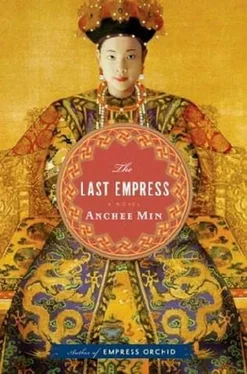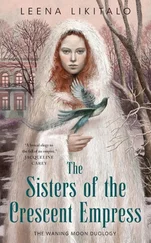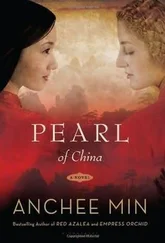My mind often wandered to my son while I was painting. At night it became difficult to concentrate. I would imagine Tung Chih's face as he lay in bed and wonder what he was dreaming. When my desire to be with him became desperate, I would put down my brush and run to Tung Chih's palace, four courtyards from my own. Too impatient to wait for An-te-hai to light the lanterns, I would rush through the darkness, bumping and bruising myself on walls and arches until I arrived at my child's bedside. There beside my sleeping son, I would check his breathing and stroke his head with my ink-stained hand. When the servant lit the candles I would take one and hold it close to my son's face. My eyes would trace his lovely forehead, eyelids, nose and lips. I would bend over and kiss him. My eyes would grow moist as I saw his father's likeness. I would remember when Emperor Hsien Feng and I were in love. My favorite moment was still the time when I sweetly tortured him by demanding that he memorize my name. I wouldn't leave Tung Chih until An-te-hai found me, his long procession of eunuchs trailing behind him, each carrying a giant red lantern.
"My tutor can paint for me," I would say to An-te-hai. "Nobody will know that I didn't apply the stamps myself."
"But you would know, my lady," the eunuch would reply quietly, and he would escort me back to my palace.
Instead of reading a book to Tung Chih in the cool shade of my courtyard, I signed an edict issuing death sentences to two important men. It was August 31, 1863. I dreaded the moment because I couldn't escape the thought of what my signature would bring to their families.
The first person was Ho Kui-ching, the governor of Chekiang province. Ho had been a longtime friend of my husband's. I first met him as a young man when he won the top rank at the national civil service examination. I attended the ceremony with my husband, who honored him with the title of Jin-shih, Man of Supreme Achievement.
In my memory, Ho was a humble man. He had deep-set eyes and protruding teeth. My husband was impressed with his broad knowledge of philosophy and history, and he appointed Ho first as mayor of the important southern city of Hangchow, and a few years later as governor of Chekiang. By the time he was fifty, he was the senior governor in charge of all the provinces of central China. Ho was granted military powers as well. He was the commander in chief of the Imperial forces in southern China.
Ho's file showed that he had been charged with neglecting his duties, resulting in the loss of several provinces during the ongoing Taip-ing uprisings. He had ordered his men to open fire on locals while making his own escape. I resisted his request to reconsider his case. He seemed to feel neither remorse nor guilt over the death and suffering of the thousands of families he had abandoned.
Ho and his friends in the court denied the fact that my husband had personally ordered Ho's beheading before his death. The strong opposition I later encountered made me realize my vulnerability. I took Ho's request as a direct challenge to my son as ruler of China. Prince Kung was one of the few who stood by me, although he kept reminding me that I didn't have the support of the court's majority.
I did not expect that my disagreement with the court would turn into a crisis for the survival of my son and myself. I was aware that Ho's behavior mirrored that of the governors of many other provinces. I would be inviting endless trouble if I failed to proceed with the prosecution.
Within weeks, I received a petition requesting that I reconsider the case. Signed by seventeen high-ranking ministers, governors and generals, the petition claimed Ho's innocence and asked His Young Majesty Tung Chih to dismiss the charges.
I asked Prince Kung to help me investigate each petitioner's background. The information Kung soon brought me showed that without exception the petitioners had been either personally promoted or recommended to their posts by Governor Ho.
The argument ran back and forth as Tung Chih and I sat through the audiences. My son was tired, and he squirmed and fidgeted on his large throne. I sat behind him, slightly to the left, and had to keep reminding him to sit up straight. In order for Tung Chih to make eye contact with the more than one hundred ministers on the floor before him, his throne had been placed on a platform. He could see everyone, and he, in turn, could be seen by all. The Son of Heaven was not an easy image for his subjects to look upon. I tried to rush the audiences so my son would be able to go out and play. They were torture for a seven-year-old child, even if he was the Son of Heaven.
The collective voice asserted that Ho's dereliction was not what it seemed-the governor was not responsible. The minister of revenue in Jiangsu province spoke as a witness: "I asked Governor Ho to come to help guard my state. Instead of being called a deserter, he should be regarded as a hero."
Tung Chih looked confused and pleaded to leave.
I excused my son and carried on myself. I remained firm, especially after learning that Ho had attempted to destroy evidence and harass witnesses.
Prince Kung quit the proceedings after days of dreadful argument, excusing himself by saying that he preferred to leave the matter in my hands. I continued to fight the court, who now demanded "a more credible investigator."
I felt as if I were playing a game whose rules I failed to understand. And there was no time to learn them. In my son's name I summoned General Tseng Kuo-fan, who had been Governor Ho's temporary replacement. I let him know that I was desperately looking for people who would tell nothing but the truth. I asked him to be in charge of the new investigation.
I explained to Tung Chih that his father and I had always had great faith in General Tseng's integrity. In an effort to keep my son interested, I told him the story of Tseng's first meeting with Emperor Hsien Feng and how the hero-warlord was terrified when the Emperor asked him to explain why he was nicknamed "Head-Chopper Tseng."
Tung Chih was entertained by tales of Tseng's exploits and asked whether the general was a Manchu. "No, he is Han Chinese." I took the opportunity to drive my point home. "You will see how the court discriminates against the Han."
"As long as he can fight and win for me," my son responded, "I don't care what race he is."
I was proud of him and said, "That is why you are the Emperor."
The court accepted my appointment of Tseng Kuo-fan, which made me think that someone must believe that Tseng was corrupt. I made it a condition that Tseng's findings would be part of the public record.
Within a month, Tseng delivered his findings before the assembled court, which pleased me greatly:
Although there were no paper documents left for my investigators to obtain, since the governor's mansion was burned down by the Taipings, the fact remains that Governor Ho Kui-ching failed in his duty to guard his provinces. Beheading would not be an inappropriate treatment, as it is the law of the Imperial government. Whether it was true or not that he was persuaded by his subordinates to desert is, in my opinion, rather irrelevant.
The hall was silent after Tseng Kuo-fan's statement was announced. And I knew I had won.
I resented the fact that it was I who had to give the final word for the execution. I may not have been as devout a Buddhist as Nuharoo, but I believed in the Buddha's teaching that "to kill is to decrease one's virtue." Such an awesome act would throw off one's inner balance and diminish one's longevity. Unfortunately, I was unable to avoid carrying out the sentence.
The second man to be prosecuted was General Sheng Pao, who was not only my friend but had also made significant contributions to the dynasty. I lost sleep over his case, although I never doubted my actions.
Читать дальше












